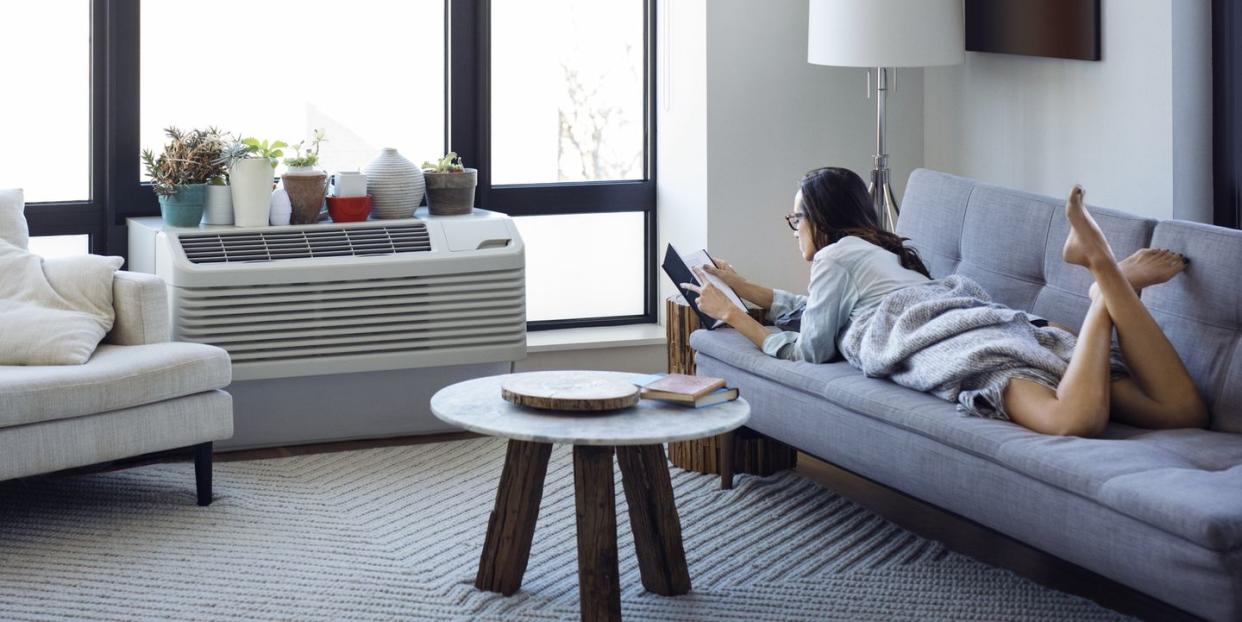Scientists Aren't Sure If Air Conditioners Can Spread Coronavirus

By this stage in the global pandemic, we all know the basics about how to avoid transmission of the novel coronavirus: wash hands often, wear a mask, maintain six feet of distance from other people in public. But as the seasons change—yes, time is passing!—and the weather warms up across the United States, one might wonder about how to behave inside given these increasing temperatures. Namely, is it safe to use air-conditioning, or open the windows for a cool breeze?
A new paper from academics at the University of Oregon and UC Davis synthesized previous research of the “built environment” and the known information around severe acute respiratory syndrome coronavirus 2 (SARS-CoV-2), and similar coronaviruses that trigger SARS. “We thought there was a sort of lack of discussion about the built environment aspect of the pandemic,” says David A. Coil, a scientist at UC Davis and a co-author on the paper, “so we put together… the sort of general knowledge we had about transmission indoors.”
The paper noted that these viruses are too small to be caught by even the fanciest AC filters. So if you thought that your residential air conditioner, whether centrally installed or in a window, would be enough to keep coronavirus out, think again. “Proper filter installation and maintenance can help reduce the risk of airborne transmission, but it is important to understand that filters should not be assumed to eliminate airborne transmission risk,” the study notes.
As to the question of whether air-conditioning ventilation actually spreads coronavirus? “Air conditioning is a little bit less well understood as to how it affects the circulation of the virus,” says Anne Liu, MD, an infectious disease physician at Stanford Health Care. She points to a recent study getting tons of international attention, in which Chinese researchers explored an incident at a restaurant in Guangzhou, China, in January, in which one diner spread coronavirus to other diners; it speculated that the pattern of the seats with regard to the restaurant’s air conditioner suggest that the air conditioner blew droplets across the other patrons, infecting them.
Of course, the patrons were also just sitting near each other, so basic proximity may have influenced transmission.
“This was all circumstantial. They have not proven that that's the case,” Liu says. “I think people are concerned that [coronavirus] might move in air conditioning units and be spread. I don't think that there's any evidence yet.” Plus, most people aren’t gathering at restaurants at the moment, so the research is not super applicable to our current behavior.
The bottom line is that experts just don’t know enough about air conditioners and this coronavirus yet, or have a solid enough conclusion to make recommendations to hospitals, restaurants, and common residences beyond taking care to clean and install filters the way you always would.
When it comes to opening your windows, you're probably itching to let the fresh spring air in. It would take very special circumstances to transmit COVID-19 through an open window. “I guess you'd have to be on a ground floor and in a crowded urban area, theoretically, and even then that would presume that people are getting close enough to your window for droplets from their mouths to be coming in, and then for you to be sitting right next to the window,” Liu says. “I guess it's possible, but I wouldn't think that it's super likely."
“Imagine you’re in a high-occupancy setting, like an apartment building, and you have someone coughing on their balcony, generating a lot of those aerosols containing the virus,” Coil says. “It’s certainly not inconceivable for those to come through the window. I don’t think it has been demonstrated.”
So if you live on the ground floor of an apartment building in a dense area of, say, New York City or Chicago or San Francisco, and people are routinely coughing right outside your window, you might want to shut it—or if you’re on an upper floor and someone’s coughing on their balcony or fire escape quite close to your own. But for the rest of urban dwellers, and for those in rural or suburban settings, opening a window is a healthy way to bring fresh air in.
If you are concerned about the hygiene of your home, the rules for spring and summer are the same ones you already know. “The number one thing, of course, is avoiding people. The way people get [COVID-19] is by breathing air with the virus that has been exhaled, coughed, or sneezed,” Coil says. “Washing your hands is absolutely a great idea. The far more important thing is just not breathing the same air as people who are sick.”
Follow House Beautiful on Instagram.
You Might Also Like

